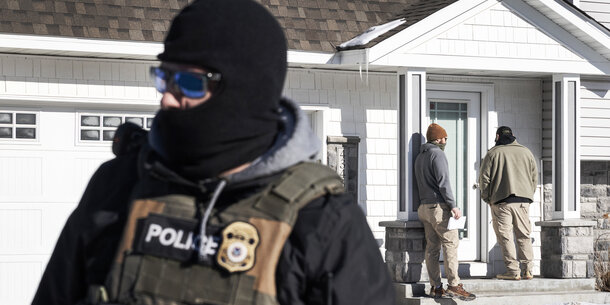A Canadian fossil fuel company is funneling millions of dollars to local Minnesota police to protect its interests and undermine the rights of protesters, many of them from Native American tribes and environmental groups. So far, the practice of companies paying police to do their bidding has faced little public scrutiny. In this case, that’s perhaps unsurprising in light of the scarce attention often given to Native Americans’ rights.
Enbridge’s Line 3 pipeline expansion will carry 760,000 barrels of oil per day from Alberta’s tar sands through Minnesota to Wisconsin and Lake Superior, operating at full capacity as soon as mid-October. The route passes through the lands of Native American tribes, who warn that the pipeline would violate their treaty rights, contribute to climate change, and risk catastrophic spills in vital watershed areas.
Over the last year, Enbridge has paid over $2 million to Minnesota police to enforce laws targeting protesters against the pipeline. The nature of the financial relationship between Enbridge and Minnesota law enforcement is laid out in the Line 3 construction permit issued by the state public utilities commission, requiring that the company deposit funds into a “Public Safety Escrow Account” managed by a state-selected third-party liaison.
The permit authorizes reimbursements for “maintaining the peace in and around the construction site” and related activities. Police have been reimbursed for activities including training, equipment, and “Line 3 Protest Response.” The funds are not supposed to be used for equipment aside from undefined “personal protective gear,” although according to reporting by the Intercept, police have requested reimbursement for “less-than-lethal” weapons such as batons, tear gas, and flash-bang devices. Without a full public record of the reimbursements, it’s unclear which requests were approved.
While the third-party liaison reviews and approves the reimbursement requests, the functional separation of power between donor and recipient is questionable. Oil and gas companies, including Enbridge, have been instrumental in lobbying for the “critical infrastructure laws” that police use as a basis for arresting protesters at construction sites. Furthermore, local Minnesota law enforcement and Enbridge employees have maintained a close partnership during the construction of the Line 3 pipeline, sharing office space, participating in joint training and meetings, and trading information on protest activities.
The funneling of funds from Enbridge to police also removes an important mechanism of public accountability and transparency. If taxpayers were financing the multimillion-dollar law enforcement fees to police the construction site, they may be motivated to join the discussion around the use of public funds and public servants to protect private property and arrest protesters.
Instead, private reimbursements for pipeline-related police activity, with no specified upper limit, incentivizes law enforcement to minimize oversight. Minnesota police can essentially get funded twice — by taxpayers and by Enbridge — when they use their resources to serve the latter. Under the current arrangement, the public must depend on news outlets to report on what activities are reimbursed. And in another barrier to public oversight, intelligence data collected by the Department of Homeland Security-supported Minnesota Fusion Center related to Line 3 has also been classified as secret “security information,” making it unretrievable via public records request.
Supporters of this financial relationship may point to the fact that police are sometimes paid by organizers of major sports games, parades, protests, or other events. However, these events operate on a much smaller scale and shorter timeline than the construction of a major infrastructure project where the police are paid to enforce laws that specifically protect the interests of the private funder.
More fundamentally, the goal of law enforcement at such events — at least in theory — is to protect the safety of the community, including the right to assemble and exercise freedom of speech. By contrast, paying police to surveil and target pipeline protesters chills and suppresses First Amendment-protected activity. In the largely isolated construction areas where protesters demonstrate, there is also no general public for the police to protect — there is only Enbridge and the protesters. At its core, the money from Enbridge motivates police to prioritize enforcing a law that uniquely benefits the corporation over the needs of the surrounding community and core constitutional rights.
Enbridge’s payments for Line 3 protection are just one of the numerous ways that private interests increasingly influence law enforcement. Many of the biggest American corporations donate hundreds of thousands of dollars to police foundations, enabling the purchase of controversial technologies — like cellphone location trackers and automated license plate scanner systems — with greatly reduced public oversight. Some of these companies may just desire the perks of a positive relationship with law enforcement, while others regularly engage with police for their security needs or technology contract bids.
Surveillance tech companies also discount or donate their products for local law enforcement. For example, Ring has provided police departments with doorbell-cameras to give out to homeowners, giving the company the appearance (if not the fact) of law enforcement endorsement. And earlier this year a $1 million private donation from a conservative billionaire financed the deployment of the South Dakota National Guard to the southern border.
But oil and gas companies stand out in the amounts of money and time bestowed upon police to directly safeguard unique private interests. One reason for this may be that post-9/11, private security guards have been considered an essential source of protection for “critical infrastructure,” because energy, communications, and transportation infrastructure is largely managed by private companies. Since 9/11, fossil fuel companies and federal agencies have used this national security excuse to pass crippling penalties against pipeline protesters and treat nonlethal protest movements focused on environmental protection as “domestic terrorism.”
The Enbridge–law enforcement financial relationship is likely to face legal challenges in the months ahead, including by the Partnership for Civil Justice Fund. Concern over the influence of private interests on public safety is not new. In 1936, for example, in response to the violent role of employer-created private police forces in cracking down on labor strikes, the La Follette Senate Committee observed that the only role of these forces was to “defend the interests of the employer, whether an individual or corporation,” with any “exercise [of] the nonpartisan functions of guardian of the law” being only “incidental.” More recently and authoritatively, the Ninth Circuit Court of Appeals ruled in 1998 that an Oregon sheriff’s department did not have the authority to accept payments from a timber company to provide private security services.
The La Follette Committee and the Oregon timber case reinforced basic tenets of the separation of private and public interests. If a similar standard is not set in the case of the Line 3 pipeline to address this clear conflict of interests and to protect protesters’ freedom of expression, we risk normalizing the practice of police serving as paid security for corporate interests.



